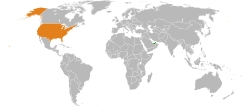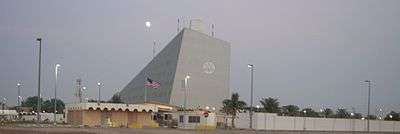United Arab Emirates–United States relations
 | |
United Arab Emirates |
United States |
|---|---|
| Diplomatic Mission | |
| Emirati Embassy, Washington, D.C. | United States Embassy, Abu Dhabi |
United Arab Emirates–United States relations are bilateral relations between the United Arab Emirates and the United States of America.
Diplomatic Relations

The United States was the third country to establish formal diplomatic relations with the UAE and has had an ambassador resident in the UAE since 1974. The two countries have enjoyed friendly relations with each other and have developed strong government-to-government ties including a close security cooperation. The quality of U.S.-UAE relations increased dramatically as a result of the U.S.-led coalition's campaign to end the Iraqi occupation of Kuwait. UAE ports host more U.S. Navy ships than any port outside the U.S.
Principal U.S. officials in Abu Dhabi include:
- Ambassador—Barbara Leaf
- Deputy Chief of Mission—Douglas C. Greene
- Political Officer—Al Magleby
- Economic Officer—Oliver John
- Consular Officer—Robert Dolce
- Public Affairs Officer—Steven Pike
- Management Officer—Stewart Devine
- Commercial Officer—Christian Reed
Leading the UAE Embassy in Washington, DC is Ambassador Yousef Al Otaiba, who presented his credentials in July 2008.
Bilateral Nuclear Cooperation Agreement
Signing and Authorization of the Agreement
On January 15, 2009, Sheikh Abdullah bin Zayed Al Nahyan, Foreign Minister of the United Arab Emirates, and U.S. Secretary of State Condoleezza Rice signed a bilateral agreement for peaceful nuclear cooperation that enhances international standards of nuclear non-proliferation.[1]
President Barack Obama subsequently endorsed the agreement and submitted it to Congress on May 20, 2009 for the mandatory 90-day review.[2] After a hearing on Capitol Hill in July 2009, leaders of the House Foreign Affairs and Senate Foreign Relations Committees issued resolutions supporting the US-UAE nuclear cooperation agreement."[3]
Potential Impediment to Approval
On April 23, 2009, ABC News released a video of UAE Royal Sheikh Issa bin Zayed Al Nahyan, "the crown prince's brother torturing a man, allegedly because he cheated him on a grain deal."[4] On April 29, 2009, CNN reported that the controversy over the torture tape was delaying the ratification of the US-UAE nuclear agreement.[5] Ultimately, the tape didn't end up holding up the agreement, which was officially submitted to Congress by President Obama in May 2009[6] and endorsed by key Congressional leaders in the subsequent months.
See also
References
- ↑ "The United Arab Emirates and the United States Sign Bilateral Agreement for Peaceful Nuclear Energy Cooperation". www.uae-embassy.org. Archived from the original on January 26, 2009. Retrieved 2009-02-02.
- ↑ White House: Office of the Press Secretary Press Release
- ↑ House Committee on Foreign Affairs, July 14, 2009 Archived October 7, 2009, at the Wayback Machine.
- ↑ "ABC News Exclusive: Torture Tape Implicates UAE Royal Sheikh", ABC News, 20 April 2009
- ↑ "Torture tape delays U.S.-UAE nuclear deal, say U.S. officials", by Elise Labott, CNN, April 29, 2009
- ↑ White House: Office of the Press Secretary Press Release
![]()
External links
| Wikimedia Commons has media related to United Arab Emirates – United States relations. |
